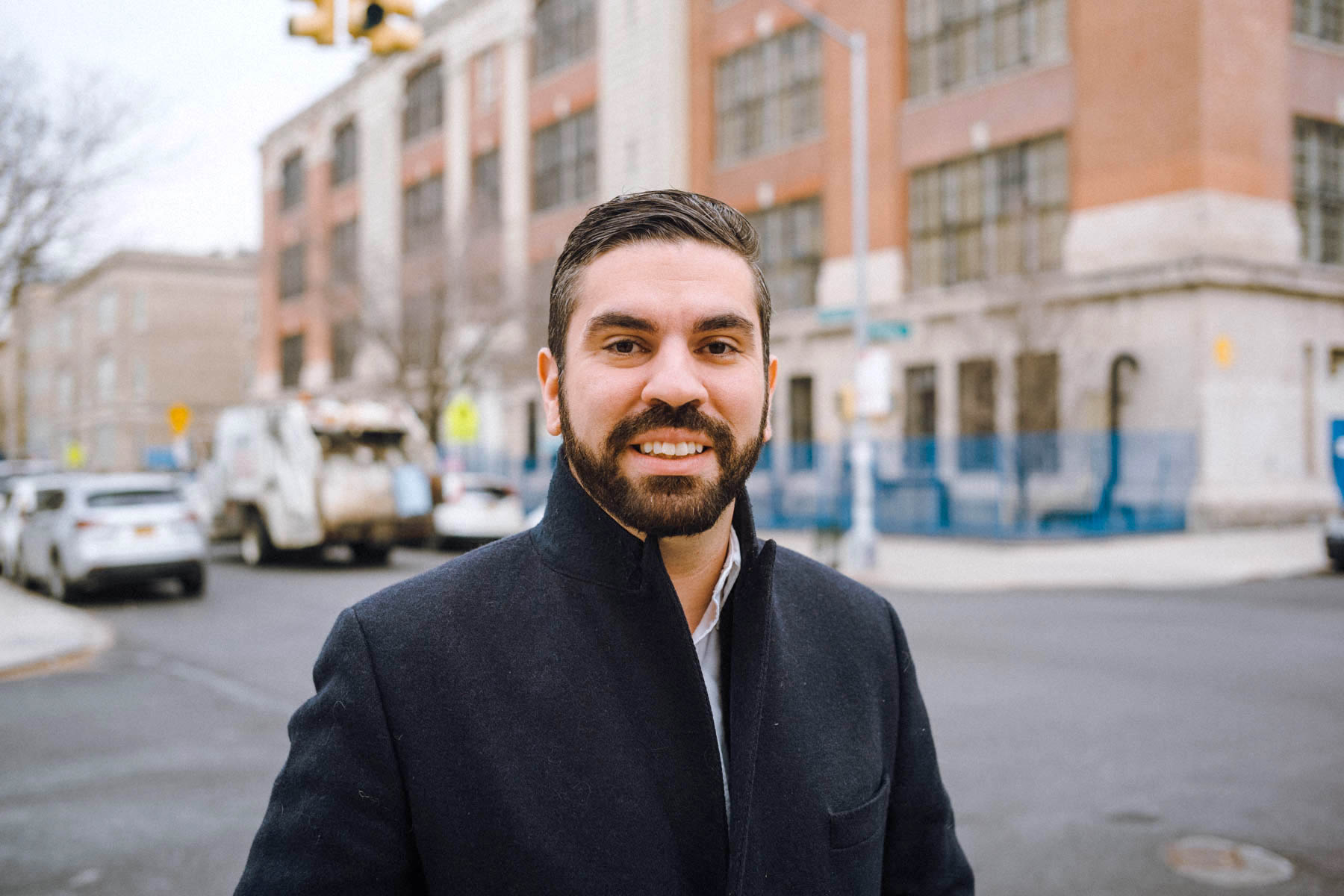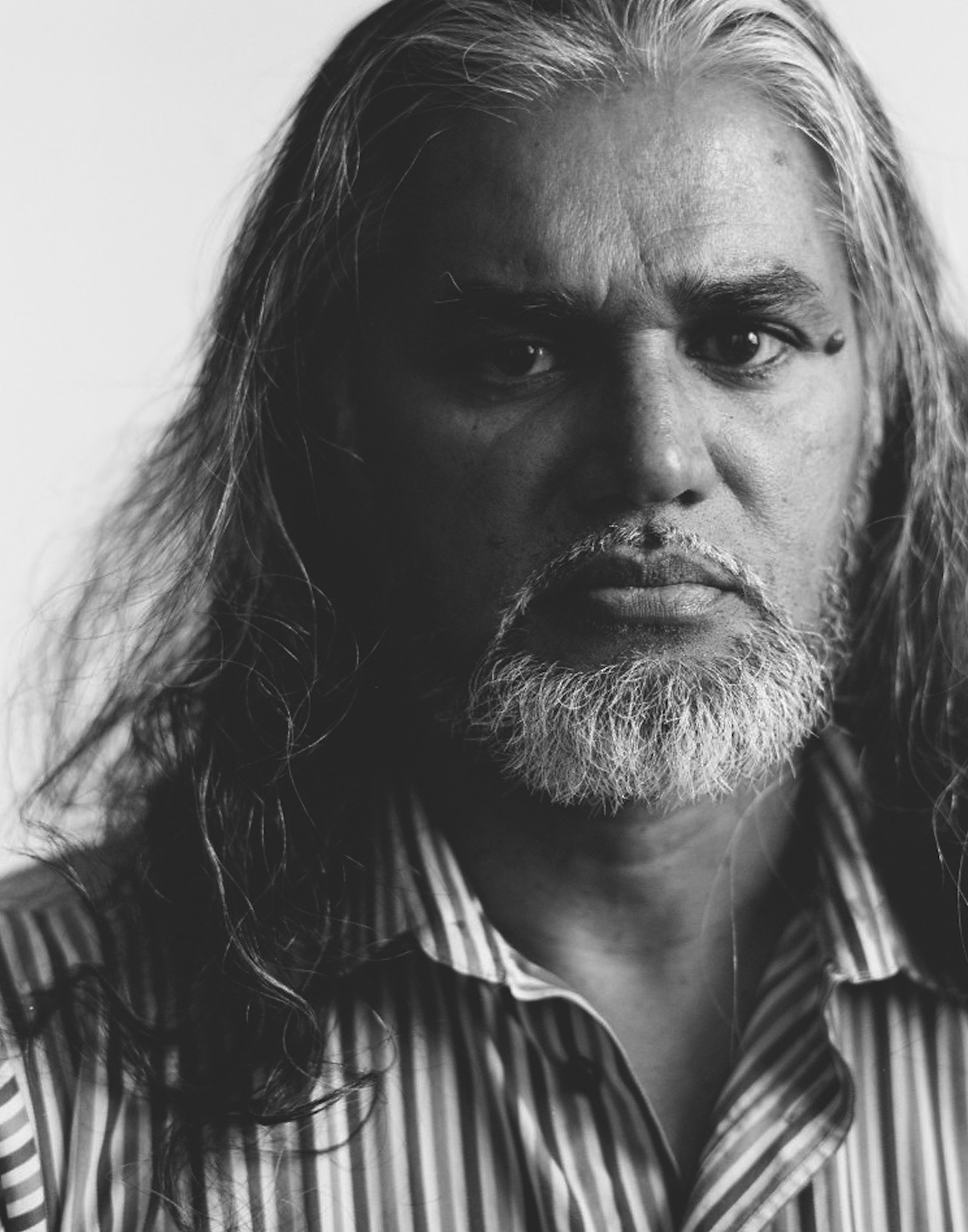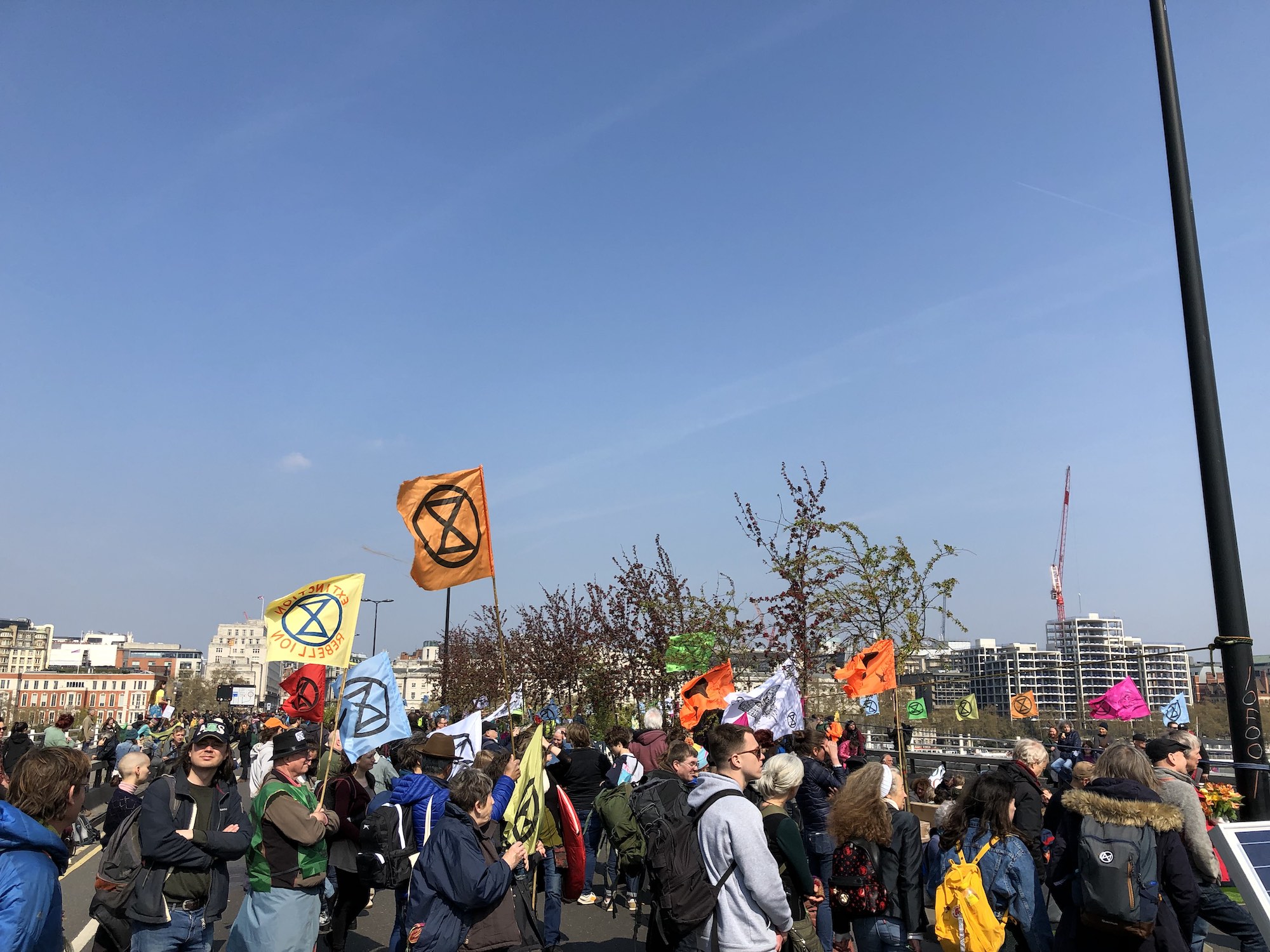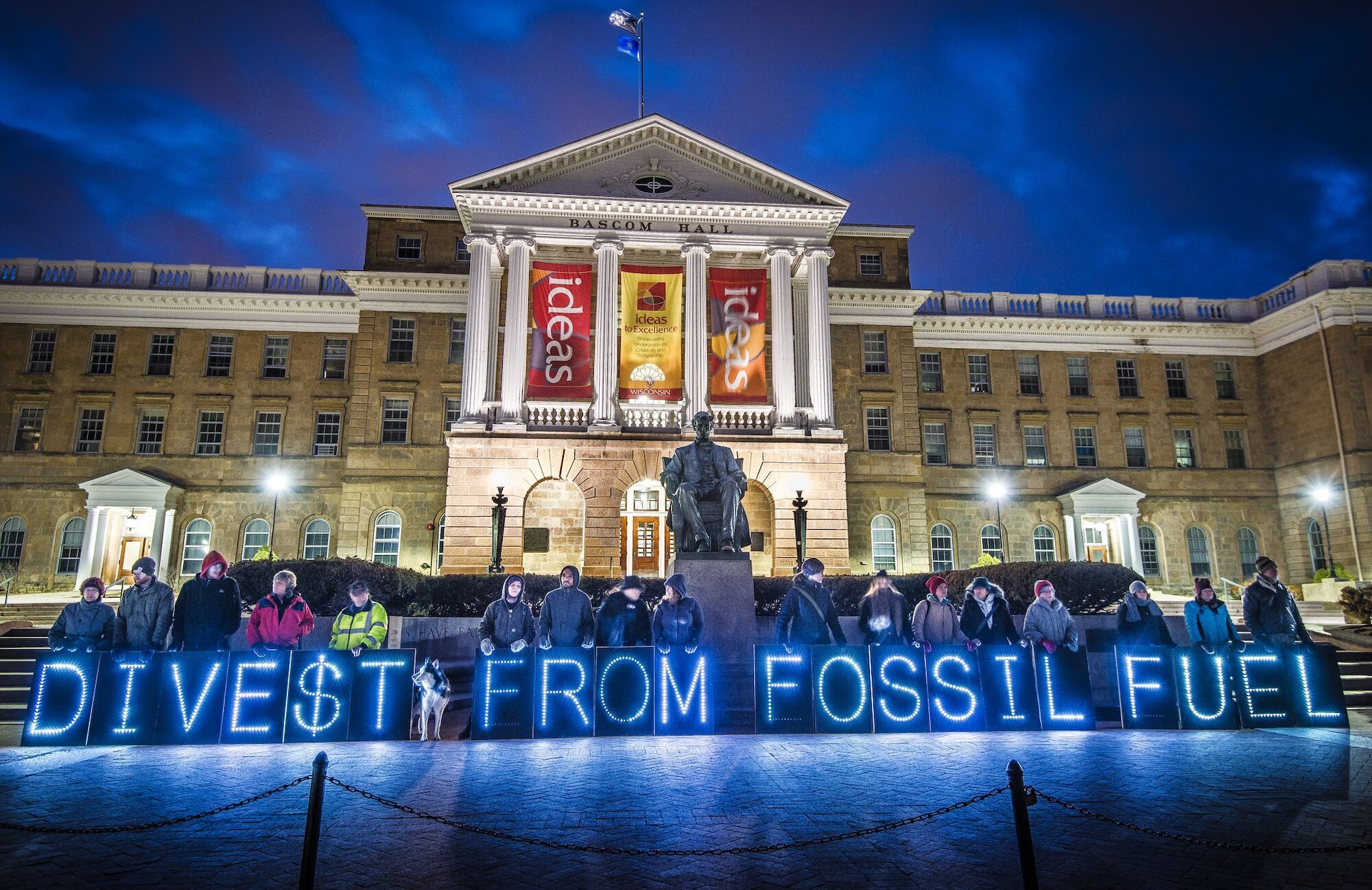Extinction Rebellion NYC
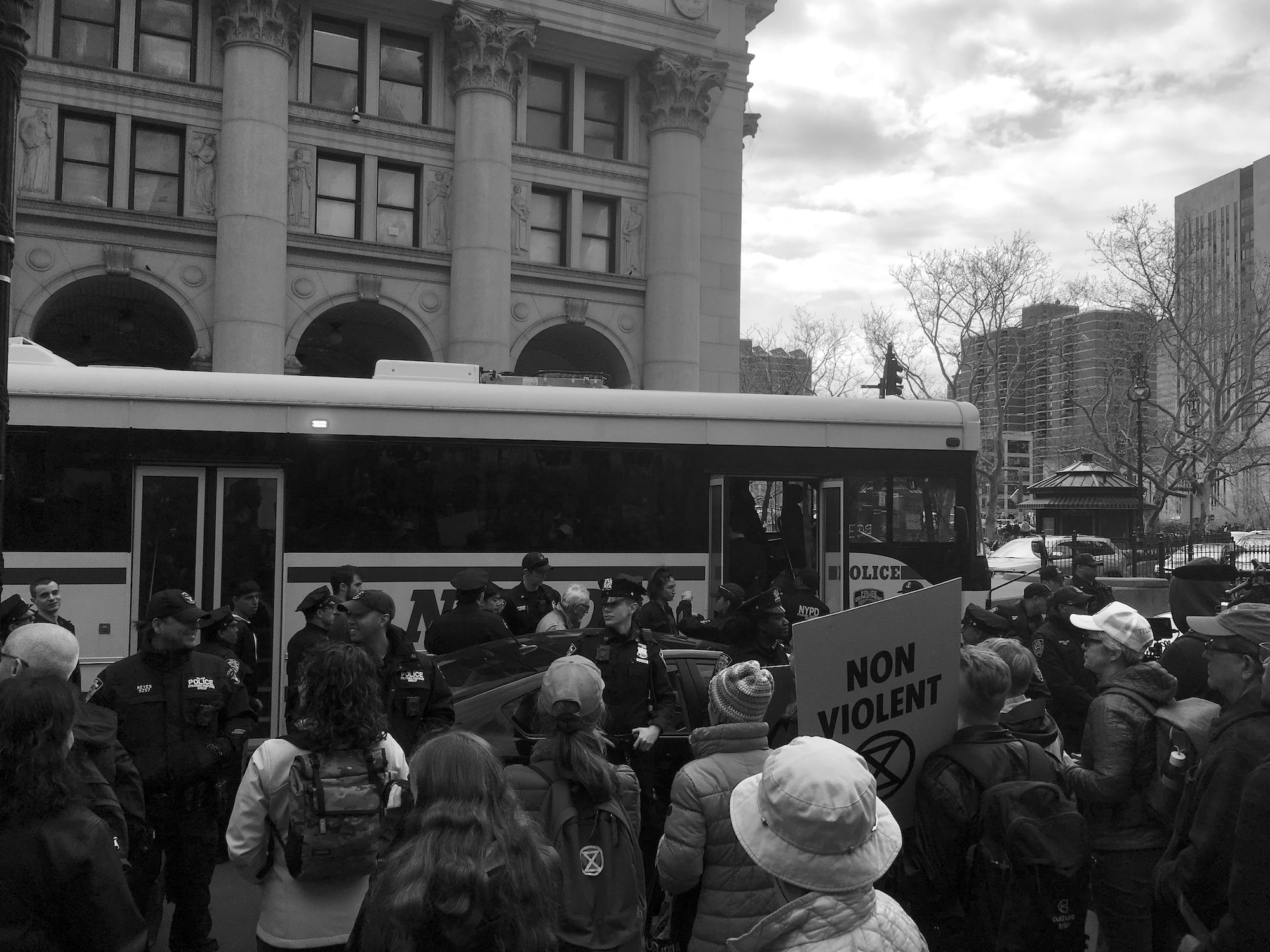
This week, Extinction Rebellion came to New York – Good Trouble went to City Hall in downtown Manhattan to find out more about this climate action group, and ask why it has taken off the way it has
Circles of power: Extinction Rebellion logo and a group of NYPD, Brooklyn Bridge in background
While groups of protesters still occupied four sites in London, on Wednesday April 17 Extinction Rebellion (XR) staged an action in New York – climbing lamp-posts to unfurl a giant banner in front of City Hall (‘Declare Climate Emergency’), and staging a mass lie-in to block the busy Brooklyn Bridge intersection – reportedly, 62 people were arrested. This wasn’t XR’s first action in New York, but their profile is growing quickly.
With origins in the UK, Extinction Rebellion is a fast-growing, decentralized global movement using direct action tactics to demand urgent, drastic action from governments to address the climate crisis. This week in London alone, more than 570 people have been arrested at a series of actions across the city, where ‘rebels’ have occupied major sites including Oxford Circus and Waterloo Bridge for days – shutting them down to traffic, and planting trees, setting up skate parks and drumming and dancing in largely good-natured protests. ‘Protester Removal Teams’ have now begun to clear the sites.
Ken Marsh, chairman of London’s Metropolitan Police Federation, said: "This is very, very difficult for us because my colleagues have never come across the situation that they are faced with at the moment… They are dealing with very, very passive people, probably quite nice people, who don't want confrontation whatsoever with the police or anyone else but are breaking the law." (Via BBC)
XR actions are now taking place around the world, including in Australia, Germany, Turkey, India, Denmark, Canada, and USA. We were able to get to New York’s City Hall just as the last of the arrestees were being loaded into the bus by NYPD, and spoke with a few of the organizers to ask why they think Extinction Rebellion is taking off globally the way it is.
“People are showing up ready to be arrested, which I just don’t think was quite in the air six months ago.”
Bob Kolodny, a Marshall with Extinction Rebellion, in front of the arrestees bus, City Hall
Bob Kolodny, New York
How involved are you with Extinction Rebellion?
Today I'm a de-escalator – that's what the yellow vest is about. We were just trying to reassure people who felt like they were being interfered with that we were sorry – that we meant no personal harm but there was an urgent situation we were trying to draw attention to. People were going down the line of drivers and cars that were stopped by the action – getting them the flyers, saying a little bit if they were interested to hear more. Most people I encountered were responsive.
They weren’t your typical angry New Yorkers, shouting at you?
I could see expressions change when I explained we were sorry for the inconvenience… I think people were pleased we at least acknowledged that we had kept them from getting to whatever it was they were headed for.
So, what’s gone down today?
Well, a number of people laid down, did a die-in on the ramp that takes traffic from City Hall Park across the Brooklyn Bridge. It's a pretty significant intersection. And a couple of people climbed the poles. You see that big white banner? One climbed the far pole, one climbed the near, and they had it on a cable – it says, "Declare Climate Emergency". That was really the theme of this event, within yards of City Hall – saying to the city, "Take this seriously."
There's a lot of police here. How have they been behaving?
The police have been pretty easy to work with. Mostly we go about our business and they go about theirs. The little bit of encounters I've either witnessed or been part of have been okay. New York has a long tradition of doing this kind of thing… although not on the climate front. This really is a departure. In some ways, it’s what's happened in England and other countries.
In London, they’re still holding four sites on the third day. They've arrested over 300 people. As Extinction Rebellion spreads to other countries around the world, do you think there are going to be any major differences in methods, tactics, reception, that kind of thing?
“I think what’s happened is that the British group just somehow caught the moment when people were saying, ‘Hey, what we’ve been doing hasn’t registered. It isn’t making enough of a difference, we’re gonna have to do something other than what we’ve already been doing so far.’”
I hadn't given it a whole lot of thought. I think that it's caught a wave here, I mean, the number of people who have become engaged with Extinction Rebellion, many of them had already been involved with climate crisis organizations. So, it's not like they haven't been involved, but they've been attracted to it.
I've seen people here from half a dozen major climate groups that are well established in New York, but I think what's happened is that the British group just somehow caught the moment when people were saying, ‘Hey, what we've been doing hasn't registered. It isn't making enough of a difference, we're gonna have to do something other than what we've already been doing so far.’
So, do you think XR have caught the mood of activists who want an escalation in tactics, to move on from campaigning to direct action?
Yeah, exactly. And so people are showing up and ready to be arrested, which I just don't think was quite in the air six months ago. But I think people were somehow feeling the need, and it just required someone with a formulation. There's something about the Extinction Rebellion message – “Tell Us The Truth" is the first demand. And it's a really moral demand. Let's be real about this, then we'll talk about what we'd like you to do about it. But stop pretending. Stop ignoring.
“I think there’s an urgency around it, there’s fear, it’s a very charged topic. ”
Liz Moyer and Zettie Shapey (l–r), in front of the David N. Dinkins Manhattan Municipal Building facing City Hall
Liz Moyer, Pennsylvania
What’s your involvement with Extinction Rebellion?
One of the main pillars of XR is regenerative culture. So, making sure that, not only do folks not burn out, but that also we organize ourselves in a way that's self-sustaining and prioritize relationships and all that other good stuff. So, I've been working more in the regenerative culture side of things.
Why do you think Extinction Rebellion has taken off that way it has?
That's a really good question. I think it's a couple different things. I think it's the timing, I think even within the scientific community there's a little bit more of an alarmist narrative going on. And then I also think that, specifically about XR, I think they do a really nice job around bringing life to the forefront of it. Both shedding light on the urgency and the fact that this leads to death. The death of species that have already passed on, or gone extinct, and then also, the reality of us potentially killing ourselves off as a species. They have that within their message, and then they also have the life portion of it, rebel for life, you know? They bring a lot of colour … It's all about the artistry behind it, too.
Do you mean the branding, the design?
Also what people bring… People are invited to bring their instruments, there's art parties where people come together and design and create. I think there's a lot of colour and music, which makes it more palatable – because this topic is hard to digest. It's hard to wrap your head around.
Do you think climate activism has struggled with that in the past?
Totally, because it's abstract.
Do you think XR has answered a hunger for more direct action at the moment?
“We just saw a guy climb a lightpost, and hang a banner and then people get arrested. We see immediate effects. Whereas, with campaigns, it can feel like you are screaming into a dark hole sometimes.”
I think there's an urgency around it, there's fear, it's a very charged topic. And so this gives a really nice outlet to express that charge, that you can see the direct effect of. We just saw a guy climb a lightpost, and hang a banner and then people get arrested. We see immediate effects. Whereas, with campaigns, it can feel like you are screaming into a dark hole sometimes.
They're equally important, and they do make traction, but it puts the power into the people's hands a little bit more. Or at least it feels that way. And again, it is very celebratory of life, while also bringing attention to a really important cause, I think that those things all work well together.
What would you say to someone if they were thinking of getting involved with Extinction Rebellion?
Oh, hell yeah, do it! It's self-organized, it’s decentralized, so two people anywhere in the world can grab the XR logo and join in. It's not meant to be coordinated by a single group, it's meant to be able to empower everyone to take it up and express it how they see fit.
Words and photos by Rod Stanley
ACTIONS
You should obviously check out Extinction Rebellion and find out more
It never hurts to brush up on the science behind climate change
Writer, editor and consultant based in London /New York




